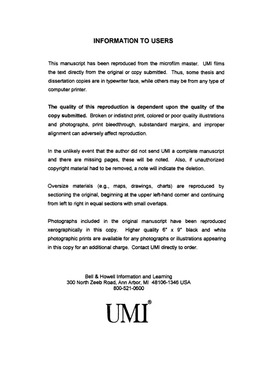| dc.contributor.advisor | Beach, Sara Ann, | en_US |
| dc.contributor.advisor | Gates, Edward, | en_US |
| dc.contributor.author | Li, Chin-wen. | en_US |
| dc.date.accessioned | 2013-08-16T12:31:13Z | |
| dc.date.available | 2013-08-16T12:31:13Z | |
| dc.date.issued | 2001 | en_US |
| dc.identifier.uri | https://hdl.handle.net/11244/6064 | |
| dc.description.abstract | Taiwanese parents and educators should first acknowledge what the students really need, then provide an environment which can help and guide them to internalize and actualize their beliefs in piano playing and nurture the connectedness between their musical lives and their lives as a whole. Thus, more self-assured and devoted musicians will benefit Taiwanese society. | en_US |
| dc.description.abstract | Interpretation of the findings was made under the four categories of research questions. External influences were important to the participants' beginning and continuing piano playing. Most of the participants held a passive attitude about their future. The participants were mostly ambivalent and uncertain about their feelings and the meanings of piano playing. Specifically, more had a negative or ambivalent attitude about performing and practicing than liked it. The majority did not think they had lives as musicians. A more negative than positive evaluation of their playing ability was evident in this study. The majority of them were dissatisfied with their overall musical training and environment. | en_US |
| dc.description.abstract | A qualitative methodology was adopted in this study. Eleven participants from three different universities and colleges in Taiwan were purposively chosen for this study. Three sources were used to collect data during April and May, 2000: individual interviews, questionnaires, and group interviews. Codes were developed by the researcher after analysis of transcripts of all questionnaires and interviews. | en_US |
| dc.description.abstract | This study implies that the reasons so many participants did not hold certain and positive attitudes toward piano playing, their playing ability, their identities as musicians, and their future piano teaching career was due to their lack of self-initiation, internalization and actualization of their piano playing. | en_US |
| dc.description.abstract | The purpose of this study is to examine the effect of Taiwanese piano education by identifying the meaning of piano playing to college senior piano majors. Four categories of research questions were addressed: (1) Why and how did the participants begin and continue playing the piano? (2) What are the feelings and meanings of piano playing, including performing and practicing, to the participants? (3) How do the participants live their lives as musicians? and (4) How do the participants evaluate their own piano playing ability, musical training and environment? | en_US |
| dc.format.extent | ix, 154 leaves : | en_US |
| dc.subject | Education, Higher. | en_US |
| dc.subject | Piano Instruction and study Taiwan. | en_US |
| dc.subject | Education, Music. | en_US |
| dc.subject | Piano Instruction and study Evaluation. | en_US |
| dc.title | The effect of Taiwanese piano education from the perspectives of college senior piano majors. | en_US |
| dc.type | Thesis | en_US |
| dc.thesis.degree | Ph.D. | en_US |
| dc.thesis.degreeDiscipline | School of Music | en_US |
| dc.note | Major Professors: Sara Ann Beach; Edward Gates. | en_US |
| dc.note | Source: Dissertation Abstracts International, Volume: 61-11, Section: A, page: 4320. | en_US |
| ou.identifier | (UMI)AAI9994078 | en_US |
| ou.group | Weitzenhoffer Family College of Fine Arts::School of Music | |
